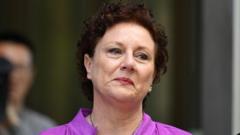Kathleen Folbigg's misjudged past and release serve as a powerful reminder of flaws in the justice system.
Once deemed "Australia's worst mother," Kathleen Folbigg's life took a devastating turn when she was convicted in 2003 regarding the tragic deaths of her four babies. After enduring 20 years of wrongful imprisonment, she was finally released in 2023 when new evidence revealed that her children's deaths might have been caused by a rare genetic condition rather than foul play. However, a recent compensation offer of A$2 million has ignited outrage, as many legal experts argue that this figure is woefully inadequate, with expectations exceeding A$10 million.
Folbigg's lawyer, Rhanee Rego, criticized the government's decision, calling it a moral affront. New South Wales Attorney General Michael Daley defended the offer, claiming it was based on careful evaluation. Folbigg's experience has sparked conversations around justice, the role of misogyny in her conviction, and the impact of her story on the legal system as a whole.
The public response reveals deep empathy for Folbigg, with many questioning how her suffering can be measured in monetary terms. Comparisons have been drawn to previous high-profile cases, such as Lindy Chamberlain, who received A$1.7 million for three years in prison after losing her baby to a dingo. As her story gains momentum, discussions on appropriate compensation for wrongful imprisonment continue.
Once deemed "Australia's worst mother," Kathleen Folbigg's life took a devastating turn when she was convicted in 2003 regarding the tragic deaths of her four babies. After enduring 20 years of wrongful imprisonment, she was finally released in 2023 when new evidence revealed that her children's deaths might have been caused by a rare genetic condition rather than foul play. However, a recent compensation offer of A$2 million has ignited outrage, as many legal experts argue that this figure is woefully inadequate, with expectations exceeding A$10 million.
Folbigg's lawyer, Rhanee Rego, criticized the government's decision, calling it a moral affront. New South Wales Attorney General Michael Daley defended the offer, claiming it was based on careful evaluation. Folbigg's experience has sparked conversations around justice, the role of misogyny in her conviction, and the impact of her story on the legal system as a whole.
The public response reveals deep empathy for Folbigg, with many questioning how her suffering can be measured in monetary terms. Comparisons have been drawn to previous high-profile cases, such as Lindy Chamberlain, who received A$1.7 million for three years in prison after losing her baby to a dingo. As her story gains momentum, discussions on appropriate compensation for wrongful imprisonment continue.
















